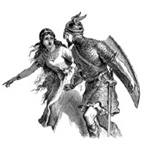
Is the Future “Female”?
DOES THE CHURCH OPPRESS WOMEN ?
In a video shown at the Makers Conference in southern California this February, Hillary Clinton prophesied that “the future is female.” Since I am an historian by training, her words set me to thinking — not only about things to come, but also about things past.
It is clear that since time immemorial, women have assumed the lion’s share of responsibility for the rearing of their children. More subtle in expression than men and more sensitive to mood changes, they also speak more facilely, averaging 170 words per minute, as compared to 150 for their male counterparts. Clearly, there are ways in which women are “hard-wired” for leadership — outside the home, as well as inside.
But much of the recent talk of women as leaders is predicated on the idea that women are only now coming into their own — the notion, in other words, that they were suppressed before the time of Christ, during the time of Christ, and indeed all the way down through the so-called Dark Ages and Middle Ages until religion lost its grip on Western culture. We’ve all heard the expression, “You’ve come a long way, baby.” Is it true?
+++
Millennia ago, as recorded in the Old Testament, women were already asserting themselves. Deborah, one of the most successful leaders during the era of the Judges, was a woman, as was Jael, who took down Sisera, the enemy general. Judith lopped off the head of Holofernes, another Jewish nemesis. Imagine how we would feel today if American women were responsible for the killing of Adolf Hitler and Osama bin Laden!
You May Also Enjoy
It's simply untrue that women were suppressed across Christendom and through the so-called Dark Ages and Middle Ages until religion lost its grip on the West.
The Christian conservative must not subsume his religion under his politics and thereby pervert a timeless Gospel into an ideological weapon.
An intelligent group like feminist theologians could manufacture six or seven attractive religious ideas in any given morning, and then invent a sacrament or two over lunch.

